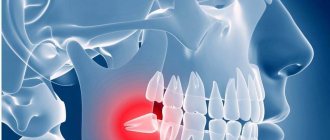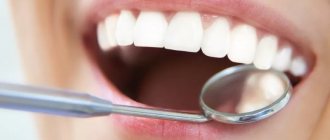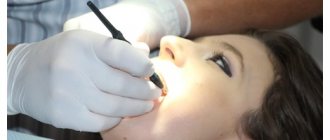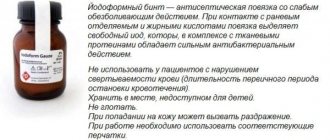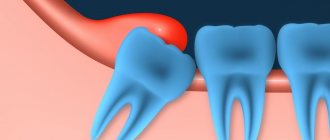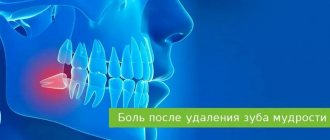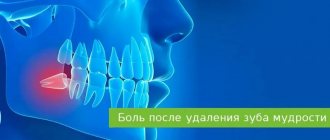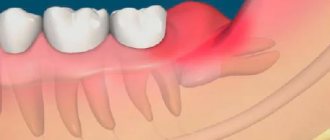A day later, he died from suffocation and extensive purulent inflammation of the throat and face.
Igor’s uncle came to the editorial office of “Nasha”. The strong man could hardly hold back his tears: talking about how, as a result of a banal tooth extraction, his family lost a loved one was incredibly difficult.
There are, on average, fifty such extractions a day in the city dental clinic, but this tooth turned out to be truly fatal for everyone.
“I don't care about anyone being punished. “You can’t bring Igor back,” Nikolai said, trying to hide his pain. “I just want our grief to serve as a good lesson to other people.” So that they can demand, defending their rights.”
Injuries during tooth extraction
They are considered a complication, most often appear on the upper jaw, the highest risk is when removing premolars and molars. If removal is difficult, there is a risk of perforation of the floor of the maxillary sinus. It becomes damaged, and a hole appears in the bony septum between the nasal and oral cavities. This may be due to the anatomical features of the jaw structure (there is no bone septum or the roots of the teeth being removed are located close to the bottom of the sinus). Another possible cause is chronic inflammation in the area of the tooth root, due to which the bone septum becomes thinner and destroyed. Such an injury is eliminated immediately. If this is not done, liquid may enter the nose when swallowed or chewed. If such a symptom appears, you should contact your dentist so as not to provoke inflammation.
But it was necessary not to endure, but to insist!
Holding back tears, the relatives reconstruct in order the story of the last two days of Igor Dubovsky’s life.
It is very difficult to speak in the past tense about a person who just a few days ago was full of life, strength, and health. It is even more difficult to imagine what enormous grief befell Igor’s family and his mother during these holidays: after all, for a mother’s heart there is nothing worse than outliving her son. Moreover, when he was overtaken by such a stupid, such an absurd death because of someone’s negligence, callousness, indifference and desire to “quickly rest”, hastily getting rid of an unwanted patient.
On June 22, when Daugavpils residents were massively purchasing groceries in joyful anticipation of the long league weekend, Igor began to be bothered by a seemingly ordinary toothache. My cheek began to swell. On the advice of friends, he went straight to the emergency room of the Daugavpils Regional Hospital. But no one there even looked at his tumor and offered no advice. Igor was simply turned around and kicked off to the city dental clinic. By the way, they actually deployed their colleague, because Igor also worked in the healthcare system - he was a driver in a city psychiatric hospital.
What to do if Igor was such a person: very calm, unable to “bump his fist” and get his way, embarrassed to cause unnecessary trouble to others. That is why he did not insist, but, patiently enduring severe pain, went to the other end of the city, to the street. Lachplesha.
And here I would like to ask our doctors the first question (apparently, rhetorical): “Dear sirs, what about the patient’s legal right to receive emergency medical care? How about the same legal right to freely choose a doctor and medical institution? Or has it already been canceled in Daugavpils?!”
Yes, according to the rules, a referral to a hospital is given either by a family doctor or a specialist. But if a person is in a lot of pain and he has already come to you! Is it really not possible to just carefully examine, understand, advise, give advice on how to remove the tumor, or at least give painkillers. And don’t push away from the patient like hell from incense. You're still at work! Or is normal human behavior in a hospital emergency room already “outlawed” in our country?!
Complications during tooth extraction
They occur rarely and may be associated with the actions of the surgeon and the condition of the dental system:
- damage to adjacent teeth or artificial crowns. The appearance of chips, fractures, other mechanical defects, weakening, loosening is possible. More often it occurs when working with molars, access to which can be complicated, due to crowding. Requires additional treatment;
- incomplete removal. After resection, a root fragment may remain in the bone. If the area is close to a nerve or there is a higher risk of additional injury, the dentist may leave it. Doctors at the DentoSpas clinic recommend atraumatic removal to prevent such situations from arising;
- removal of a section of the alveolar ridge. If the forceps were applied to the bone tissue surrounding the tooth, it can be removed along with it. This results in a serious bone defect. To remove it, plastic surgery is performed, protective membranes and bone tissue blocks are installed;
- jaw fracture. The risk of such a complication is increased with a weak jaw bone structure. Its changes may be associated with osteoporosis and other diseases.
“They don’t die from this!..”
In dentistry, Igor had an appointment with Dmitry Shingarev, a certified doctor with extensive professional experience and an excellent reputation, a truly excellent specialist. As the doctor himself now says, he did not notice any tumor. And Igor was again embarrassed to say that he felt very bad, believing that the doctor knew better. To be honest, he was afraid of dentists since childhood.
The tooth was safely removed, and the patient was told to rinse the wound with chamomile infusion. All. The freezing worked, the pain began to subside, and Igor, sighing with relief, went home.
However, at home, the tumor not only did not subside, but began to increase. Igor suffered all night, but endured until the last, because the doctors seemed to have done everything that was necessary. Chamomile didn't help. During the day the swelling spread from the face to the neck. Igor could not stand it and again went to the clinic, which that day worked according to the weekend schedule - the doctor on duty was on duty until 15:00.
Now no one can say for sure which particular employee or visitor to the dental clinic told Igor that they wouldn’t be able to see him anyway - goodbye. Only one thing is known: he gave in again and patiently went home.
In the evening, Dubovsky began to experience severe suffocation. The ambulance that was called could not help him and was forced to call the resuscitation team. But the latter were also powerless...
The epicrisis (doctor's report) indicates the cause of Igor's death: asphyxia (suffocation), extensive purulent phlegmon (inflammation) of the throat and face.
As the pathologist told Igor’s relatives, they don’t die from this.” Apparently, the doctor meant that such problems are easily solved by modern medicine, and such cases should not end in death. If only... it weren’t for a series of examples of banal medical negligence, sometimes reaching the point of basic disregard.
Don't they die from this? Maybe somewhere they don’t die... But in Daugavpils they do! Healthy, full of energy men...
How not to die from a bad tooth
Cellulitis is a diffuse purulent inflammation, which, in the absence of adequate treatment, leads to death. Quite often, the cause of the formation of phlegmon is a diseased tooth. Igor Panin, head of the department, told the Sibmeda portal how to avoid becoming a victim of a deadly disease. Department of Maxillofacial Surgery of the Novosibirsk Regional Hospital.
– Igor Anatolyevich, is phlegmon a common disease?
– Phlegmons of various localizations, including those of odontogenic etiology, that is, from teeth, are quite common. Patients with phlegmon make up a significant part of the patients in our department.
- What is the reason?
– Despite the rapid development of dentistry, patients with a healthy oral cavity are not as common as we would like.
Diseased teeth are, most often, the cause of the development of severe phlegmons of the face and neck, which regularly lead to death in this group of patients - due to neglect and the development of associated complications.
Such complications include the development of chest inflammation, various types of breathing problems, sepsis, as well as some other conditions that can lead to the death of the patient.
It happens that the development of phlegmon is associated with the removal of teeth, and with the fact that the inflammatory process from the tooth, despite its removal, spreads to the surrounding tissues.
In most cases, the reason for the development of phlegmon is the lack of visits to dentists and late treatment when complications develop.
– Can phlegmon develop from pulpitis?
– It is incorrect to say that phlegmon develops as a result of pulpitis. This is not typical for pulpitis. Still, phlegmon often develops when the pulp is no longer present, and when there is an inflammatory process in the area of the roots of the teeth.
– Does the development of phlegmon often end in death for the patient?
– Unfortunately, every year people die from phlegmon of odontogenic etymology in the Novosibirsk region. I won’t say that such cases are registered every month, but every year.
Fortunately, most patients can still be cured if treated in a timely manner.
But if we talk about advanced cases, when the patient needs to be treated for complications that have already developed, then we have such patients all the time. As a rule, they are in the intensive care unit. Their recovery is a long process; the state has to invest large sums of money for such patients. The process of treating a patient with severe phlegmon can take more than a month.
– It turns out that such dangerous consequences arise simply because of a tooth that is not treated in time?
- More often. There are, of course, other causes of phlegmon - consequences of injuries, various inflammatory diseases of the tonsils, but the most serious problem is precisely those phlegmons that develop as a result of dental disease.
Cellulitis that develops from tonsils or injuries is still of a milder nature than phlegmon from teeth.
The largest group of patients are patients who sought medical help late. When a person has a toothache, he self-medicates: he rinses with soda, takes pills, but the tooth continues to ache, and the inflammatory process extends beyond the boundaries of this tooth into the surrounding tissues, with the development of severe complications.
Less often, situations arise when a patient consults a doctor to remove a diseased tooth or treat it, but despite the fact that the doctor carries out therapeutic measures, the inflammatory process progresses and the patient, as a rule, comes to us.
– How quickly does phlegmon form? This is not an instant process, is it?
– In fact, the microflora in teeth is aggressive, and the development of phlegmon can occur within hours. The speed of development depends on the general condition of the body, age, use of antibiotics and some other factors that can stop this process. But these processes are very serious, and the development of complications cannot always be predicted.
Therefore, if there is a suspicion of phlegmon of the oral cavity and neck, first of all, an urgent visit to the hospital is necessary, where a decision on further treatment tactics will be made.
– By what symptoms can one suspect phlegmon?
– As a rule, the process begins with swelling on the face or neck. The mouth may have difficulty opening, and there may be pain when swallowing. The development of phlegmon is always accompanied by fever, weakness, and sweating.
The presence of swelling on the face and high temperature is a reason to contact a dental surgeon at the clinic as quickly as possible.
In our city, you can get dental care around the clock. And the clinic doctor, even if he cannot provide assistance himself, will assess the patient’s condition and refer him to the hospital if necessary.
– How long does it take for a patient to seek medical help?
– Let’s just say that time in this case does not work for the patient. The faster the better. With timely treatment, you can get by with a smaller amount of surgical intervention. When the situation has not reached the point of phlegmon, and the inflammation is localized in the area of the tooth, it does not spread to the surrounding tissues.
Still, more often it happens like this: the tooth was removed, antibiotics were prescribed, if necessary, and the purulent process stopped there. Most of these patients are treated on an outpatient basis.
But in this group there are patients when the inflammation spreads to neighboring areas, and then the person must be hospitalized in a hospital.
– Is it possible to confuse phlegmon with another acute disease?
– There is confusion with some diseases that are also accompanied by swelling in the neck. If in doubt, it is important to contact the appropriate specialist - a dental surgeon at the clinic, first of all. He will make a decision and, if necessary, send you to the hospital.
– Which medical institutions in Novosibirsk provide assistance to such patients?
– In our city, inpatient care for patients with phlegmon is provided in three hospitals. For the adult urban population - in the department of maxillofacial surgery of the 34th hospital, for the regional population - in the Novosibirsk Regional Hospital and for the children's population - in the 3rd emergency hospital.
– How is the diagnosis of “phlegmon” made or specified?
– As a rule, the diagnosis is made primarily on the basis of clinical data. This does not require any special examination. Tomography can be performed to clarify which areas are affected by phlegmon in a given patient.
– What treatment methods are used for phlegmon?
– The only possible method of treating patients with phlegmon is surgery: wide incisions are required to eliminate the purulent process. No other has been invented yet. No pills or injections will help without surgery.
It is important to know: patients with phlegmon are not treated with antibiotics. Antibiotics are used after surgical treatment, and not instead.
Everything must be combined - surgery, antibiotics, infusion therapy, and many other procedures.
– Igor Anatolyevich, how can you protect yourself from such a dangerous disease as phlegmon?
– It is important to remember that the presence of rotten teeth in the mouth is a time bomb that can explode at any time. There is, of course, an element of luck, but I don’t recommend relying on it in this matter.
Therefore, the main preventive measure is, of course, regular visits to the dentist in order to treat carious teeth, sanitize foci of chronic odontogenic infection, so as not to lead to the development of phlegmon. After all, the strategic task is not to consult a doctor at the right time, when phlegmon has already developed, and not to allow its development, in principle.
Subscribe to our Instagram and Facebook to keep abreast of exciting events and news from the world of medicine, health and beauty.
Fact
“Nasha” contacted the Health Inspectorate regarding the incident. Here they explained to us that Igor Dubovsky’s relatives must write a statement, which they can submit to the Latgale branch of this inspection. But it’s better to send him to Riga right away.
“I have already warned my colleagues about this case, and we are waiting for their statement,” the Health Inspectorate employee told us at the end of the conversation.
We remind you that you should send your complaints to the Health Inspectorate at the following address: Klijānu iela 7, Riga, LV-1012, Veselības inspekcija. Contact phone: 67819671; fax: 67819672. Email address; website www.vi.gov.lv.
Possible complications
Wisdom tooth removal is one of the most difficult operations in dentistry. Therefore, after it is carried out, various complications cannot be excluded. Thus, during the operation, neighboring “sevens” are sometimes damaged. Such severe consequences are the result of incorrectly chosen treatment tactics, as well as the low qualifications of the dentist, who was unable to understand the peculiarities of the patient’s anatomical structure.
Mature patients in some cases experience damage to the nervous system and, as a result, impaired sensitivity and numbness. Young patients encounter such disorders much less frequently.
A few hours after the removal of a wisdom tooth, bleeding may develop, which is most often provoked by intense rinsing, irritating the wound with the tongue, or eating hot food. This disorder is especially dangerous for patients suffering from hypertension and bleeding disorders.
Dry socket is the most common postoperative complication. Normally, after a wisdom tooth is removed, a blood clot forms in the socket, which promotes rapid healing of the wound. Sometimes a clot does not form, most often in smokers. After a few days, acute pain may appear, for which you should definitely consult a doctor.
Why remove wisdom teeth?
PHOTO: Extracted wisdom tooth. Please note: the roots spread in different directions, thanks to which the tooth is held very firmly in the jaw.
Removal of a wisdom tooth is resorted to in situations where, in the process of its development and eruption, it threatens the health of nearby healthy teeth, adversely affects the development of dental occlusion, or there is not enough space for eruption. When a wisdom tooth does not have enough space in the dentition, it begins to “push” adjacent teeth, which often causes malocclusion and the appearance of crowding of the front teeth in older age. A beautiful smile with evenly spaced teeth can be lost due to loose front teeth.
If infection and inflammation of the gums develop in the retromolar area, pain appears when opening the mouth and eating - it becomes difficult to open the mouth; The submandibular lymph nodes enlarge, body temperature rises. Inflammation of the gum mucosa may decrease and disappear, or an abscess (abscess) may develop, which will require emergency surgery and hospitalization. If a wisdom tooth constantly bothers you, the gum above it hurts (the hood of the mucous membrane), it must be removed.
Incorrect position of the third molar in the dentition is often the cause of the development of caries both on it and on the adjacent tooth. Treatment of wisdom teeth is difficult due to their remote location in the oral cavity and causes patients a lot of discomfort, as they have to sit for a long time with their mouth very wide open.
What to do after wisdom tooth removal to avoid complications -
What to do after wisdom tooth removal will depend on the complexity of the removal. If the removal was simple (that is, it was not accompanied by an incision in the gum and cutting out the bone), then standard recommendations after removal will be sufficient. If the removal was difficult or was carried out against the background of purulent inflammation, then the following must be added to these recommendations...
- Antihistamines - these drugs are also called antiallergic. Taking them will reduce the swelling of the soft tissues of the cheek after removal, which will certainly appear the next morning, and in addition, they enhance the effect of analgesics. It is best to take Suprastin. This is a very strong drug, but with a hypnotic effect. Therefore, we recommend taking it in the first 2-3 days after removal shortly before bedtime (once a day).
– it is best to use analgesics from the NSAID group (non-steroidal anti-inflammatory drugs), which have both analgesic and anti-inflammatory effects. These include products based on ibuprofen, ketoprofen, etc.
NSAID-based analgesics
It is best to start taking these medications before your anesthesia wears off. Read about the right choice of medications at the link above. It is best to use them for the first 3 days, then as needed.
- Antibiotics – after a complex extraction, or if the removal was carried out against the background of inflammation in the tooth, taking antibiotics is mandatory. Because After tooth extraction, a bone wound is formed, then antibiotics should be specific to bone tissue. At the moment, the most popular antibiotics among dental surgeons are several drugs.
Firstly, Amoxiclav. The dosage for adults should contain 500 mg of amoxicillin and 125 mg of clavulanic acid. At this dosage, the drug is taken only 2 times a day. However, if you previously experienced diarrhea after taking antibiotics, then it is better to purchase another drug - Unidox-solutab in soluble tablets (taken 100 mg 2 times a day, 5 or 6 days).Very often, doctors also prescribe a drug from the Soviet past - Lincomycin capsules 0.25 (adult dosage - 2 capsules 3 times a day, for a total of 5-6 days). It is inexpensive, effective, but kills the entire intestinal microflora, causing you to suffer from dysbacteriosis later.
How is wisdom tooth removal performed in our clinic?
- Before the procedure itself, the patient undergoes diagnostics from the surgeon, as well as, if necessary, professional hygiene and sanitation of the oral cavity.
- Antiseptic treatment of the surgical field is carried out.
- Introduction of anesthesia. Usually, 10-15 minutes are enough for it to start working.
- The tooth itself is extracted using a suitable method.
- After which, if incisions were made, or the resulting hole is too large, sutures are applied.
- Tamponade is performed to stop bleeding.
Is prophylactic removal justified?
There are organs in the human body whose functions have been lost as a result of evolution. For example, this is considered the appendix (although scientists have not yet clarified its purpose), ear muscles and coccyx (former caudal vertebrae). Wisdom teeth are the same rudimentary organ. Previously, they were used to chew hard food. After humanity switched to soft food prepared in kitchens, they became unnecessary.
Many owners of “lucky” teeth are ready to remove them immediately after eruption, especially if it was problematic. Anatomically, vital nerves, lymph nodes, and blood vessels are located next to these teeth. Inflammation in this place can quickly go deeper and become dangerous not only to health, but also to life. Therefore, some surgeons adhere to the theory of prophylactic removal. If the patient is not ready to run to a specialist at the first pain or cannot do this due to the remoteness of the clinic, then it makes sense to remove these teeth.
Sometimes “eights” are removed for cosmetic reasons, when all the teeth cannot fit on a narrow jaw and the dentition begins to bend. In this case, the decision must be conscious and thoughtful. If the patient's teeth are all in good condition, and aesthetics are really important, then sometimes it really makes sense to sacrifice something. But it is often possible to do without this.

